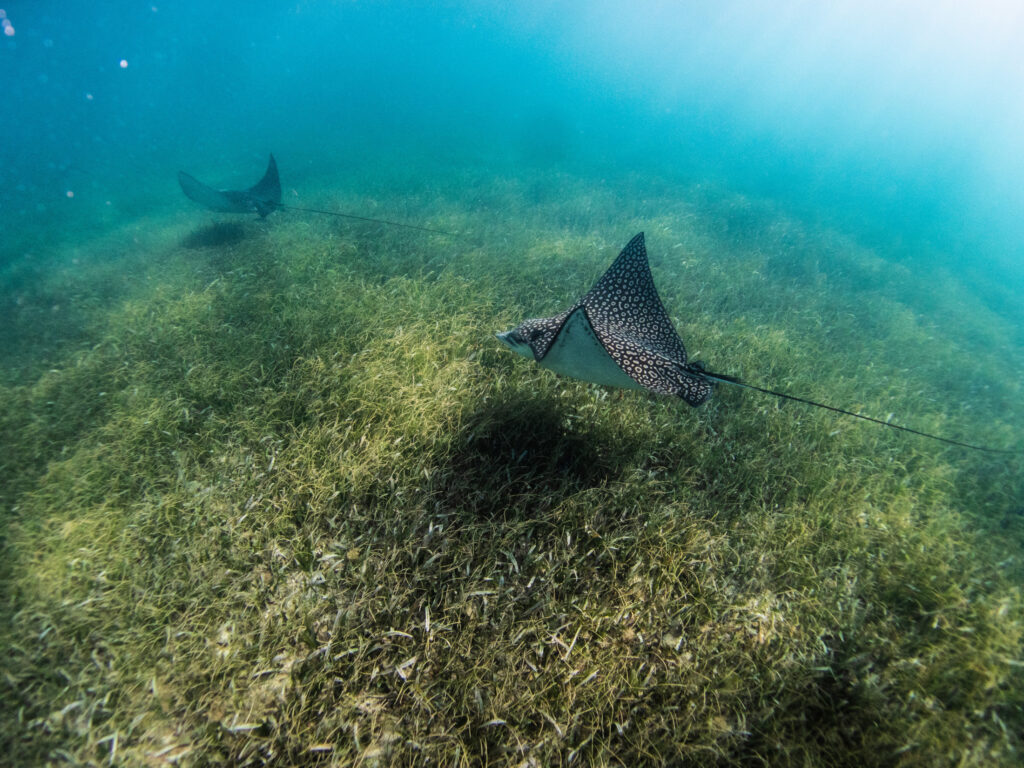By JoAnn Adkins, FIU News
The world’s seagrasses possess a remarkable ability to capture and store vast amounts of carbon, according to a global study published in Nature Communications.
The comprehensive analysis, led by FIU scientists in partnership with Conservation International and its International Blue Carbon Institute, draws on an unprecedented number of samples from across the world and illuminates the significant role of seagrasses in mitigating climate change. The study predicts that protecting at-risk seagrass meadows could avert climate damages valued in excess of $200 billion by preventing the release of 1.2 billion tons of carbon pollution. This is equivalent to removing the annual carbon footprint of 100 million U.S. homes.
“Seagrass meadows are not just important for marine biodiversity, they are a critical piece of the climate puzzle,” said lead author Johannes Krause, assistant research professor in FIU’s Institute of Environment. “This research underscores their vast potential as carbon sinks and the importance of accurate data to ensure we’re protecting them properly.”

Despite covering only 2% of the ocean floor, vegetated coastal ecosystems store nearly half of the organic carbon buried in ocean sediments. This latest study is the most comprehensive review of vegetated coastal ecosystems to date, drawing from 3,240 seagrass and soil samples spanning 61countries. By examining more data points than ever, the scientists identified a far greater variation in seagrass carbon storage than previously recognized, revealing a much wider range of carbon storage in plants and sediments across species and regions.
“Seagrass ecosystems are the unsung heroes of climate change mitigation,” said Emily Pidgeon, a co-author of the study and vice president for Ocean Science at Conservation International. “Found on every continent except Antarctica, these crucial ecosystems are the critical foundation for coastal communities, yet significantly understudied and undervalued.”
According to the study, seagrass meadows in the Tropical Atlantic — including along Florida’s coastline — and Temperate Southern Africa hold the highest carbon stocks that far exceed the global median. In practical terms, a single hectare of seagrass in these regions can store the equivalent of 10 to 22 cars’ worth of annual emissions. Small delta regions along the coasts of South Africa, Spain, Italy, Greece, France, Colombia and Malaysia also showed above-average carbon storage, suggesting they may offer ideal conditions for seagrass carbon sequestration.
FIU Distinguished Professor James Fourqurean co-authored the study which builds upon his decades of research on blue carbon, which describes carbon captured by the world’s oceans and coastal ecosystems. He says this latest research provides a much more comprehensive and clearer understanding of how much carbon is being stored along the world’s coastlines.
“Knowing the importance of seagrasses does not change the fact that we are still losing these valuable resources at a faster rate than the Amazon rainforests,” Fourqurean said. “We’ve answered one important question in terms of how much carbon is in these ecosystems, but we still have work to do in terms of protecting them and making sure the carbon stays there.”
Seagrass carbon storage varies by species, according to the scientists. Some store more carbon than others, especially those with strong roots. This means it’s important to study which seagrass species are present when estimating carbon storage in a given meadow. The study emphasizes that conserving existing seagrass meadows is among the most cost-effective strategies for mitigating climate change. Immediate actions are critical, including integrating seagrass protection into country commitments to the Paris Agreement and expanding carbon credit methodologies to include seagrasses as a source of blue carbon.
“If we don’t act now, we risk losing these ecosystems and the carbon stores they built up over centuries, compounding the effects of climate damage,” Krause said. “It’s time to prioritize seagrass conservation and research globally.”
This work was just grant funded by Conservation International.
This piece was originally published at https://news.fiu.edu/2025/protecting-seagrasses-is-essential-to-preventing-climate-damages-research-finds. Banner photo: Seagrass (James St. John, CC BY 2.0, via Wikimedia Commons).
Sign up for The Invading Sea newsletter by visiting here. To support The Invading Sea, click here to make a donation. If you are interested in submitting an opinion piece to The Invading Sea, email Editor Nathan Crabbe at nc*****@*au.edu.



